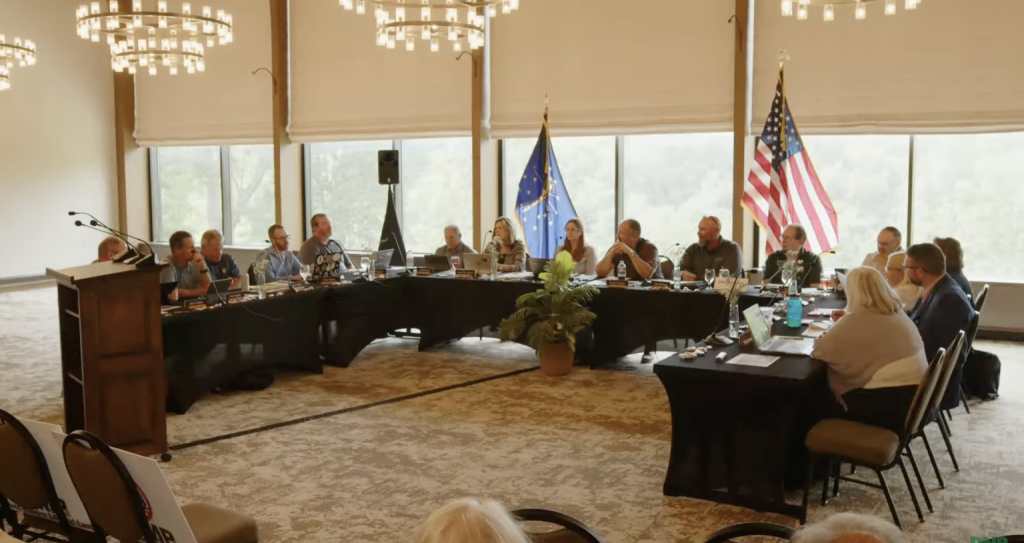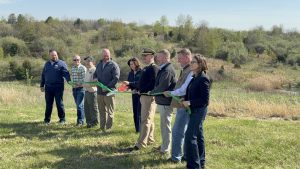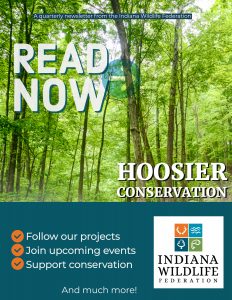ENVIRONMENT
Indiana bill takes aim at chronic wasting disease, but critics fear plan will hurt wild deer
Karl Schneider
Indianapolis Star
Published 5:18 a.m. ET Feb. 13, 2025
A state lawmaker’s proposal aimed at protecting Indiana’s wild white-tailed deer from a fatal disease is drawing support from deer farmers, but has many hunters and wildlife advocates concerned.
House Bill 1417, filed by Rep. Robert Morris, R-Fort Wayne, would create a pilot program to combat Chronic Wasting Disease by testing deer and looking for certain genetic markers that create a higher resiliency to the fatal disease. It also would require the state’s Board of Animal Health and Department of Natural Resources to create a program to “enhance the genetic durability of Indiana’s white-tail deer population.”
The bill passed its initial committee hearing but faces a Feb. 17 deadline for approval by the full House before it is sent to the Senate. It’s unclear if the bill will make the deadline.
The goal of the proposed project is to selectively breed deer with genetic markers that appear to provide more resiliency to CWD, effectively letting deer with infected with the disease live longer.
“With the newly collected data,” Morris said, “the state will be better informed and better able to address (chronic wasting disease) in the future.”
Where the discussion gets dicey is over the concept of releasing those new, genetically modified deer to mate with white-tailed deer in the wild.
The bill initially would have required DNR to release the deer with better resiliency to CWD into the wild, but the language — and directive — was dialed back at a committee hearing in late January to make releases optional rather than mandatory.
Still, the approach is concerning to Catherine Appling-Pooler, director of policy for the National Deer Association. She said the organization is not opposed to genetic research in deer, but the Indiana bill is putting the cart before the horse.
“We don’t support the release of captive deer into the wild,” Appling-Pooler said. “That’s not part of CWD management recommendations.”
The bill sounds great on paper, she said, but a deeper examination of the language causes concern and CWD management should not be forced through legislation.
“By mentioning the release of captive deer, it seems to me like the conclusion has been drawn before the research has been done,” Appling-Pooler said. “The last time I checked, that’s not how it works.”
What is chronic wasting disease?
Chronic wasting disease is a terminally fatal illness brought on by abnormal proteins — known as prions — in deer, elk and moose. The abnormal proteins can gather in an animal’s central nervous and lymphatic systems and cause degeneration, or “wasting-away” death, according to the USDA.
There are no cures or vaccines for the disease, and infected deer can spread the disease through saliva, feces and urine even before appearing sick. The abnormal proteins can stick to the soil and plants and remain infectious for years, according to the Cornell Wildlife Health Lab.
Indiana documented its first case of chronic wasting disease last April during deer season in LaGrange County. The infected deer likely crossed into the state from either Michigan or Ohio, according Chris Smith, deputy director of DNR.

The aim of the bill
Morris said HB1417 would help Indiana establish a baseline for its deer population by collecting more data. It also establishes rules for the pilot program to make sure it works best for the state.
Chris Seabury, a veterinary professor at Texas A&M University, testified during a House Natural Resources committee hearing. Seabury said he has worked with prion diseases for 25 years and developed a system that scores deer based on how resistant they were to CWD.
The scores can help selectively breed deer that can live longer with CWD.
Seabury said he and his colleagues used this system to successfully clean up a captive deer breeding operation suffering from CWD. Since then, Texas and Oklahoma have also tried this system on wild deer populations.
Gathering data on Indiana’s deer population is imperative, Seabury said. There is, however, no next step toward combating CWD and this bill would provide Indiana with a way to manage the disease.
Smith, the deputy DNR director, said one of the department’s main concerns is the cost of testing. Each test will cost $75, which does not include the staff time to collect the samples. DNR would require several thousand tests to get a genetic baseline.
Deer farmers in Indiana testified in support of the bill during hearing, but hunters and wildlife advocates remained opposed.
Buck Fever:Trophy deer industry linked to disease, costs taxpayers millions
Keeping wild deer wild
Gene Hopkins with the Indiana Sportsman’s Roundtable told state lawmakers the health of the state’s wild deer herd and the preservation of wild heritage genetics is important and opposed the bill.
“The Indiana deer herd is the envy of the Midwest and probably the nation,” Hopkins said. “We don’t want to risk what we have spent all these years building.”
Dan Boritt, executive director of the Indiana Wildlife Federation, told IndyStar there is no clear science that shows selective breeding prevents death when a deer has chronic wasting disease.
“Living longer sounds great, but if you are still being infected and living longer, you are further able to spread this highly contagious disease throughout the population,” Boritt said.
States like Pennsylvania, where estimates show there’s about a 75% occurrence of CWD in deer, might be better suited for this kind of project, Boritt said.
“In a state like Indiana where we have only this one instance documented in the wild, why would you risk spreading that disease further throughout the herd?” Boritt said.
Matt Wright, executive director at the Conservation Coalition of Oklahoma, said science at this time does not back these releases into the wild.
Oklahoma passed a nearly identical bill last year and is on track to begin releases into the wild. Wright said his organization did not support the Oklahoma legislation because it involved the state’s wild deer population. For now, he said, that work should remain in the lab.
“We have no problem with research to beat CWD,” Wright said. “But if you do release these deer into the wild population, there is no turning that back. They are out there.”
IndyStar’s environmental reporting project is made possible through the generous support of the nonprofit Nina Mason Pulliam Charitable Trust.
Karl Schneider is an IndyStar environment reporter. You can reach him at karl.schneider@indystar.com. Follow him on BlueSky @karlstartswithk.bsky.social





 Image by
Image by 













